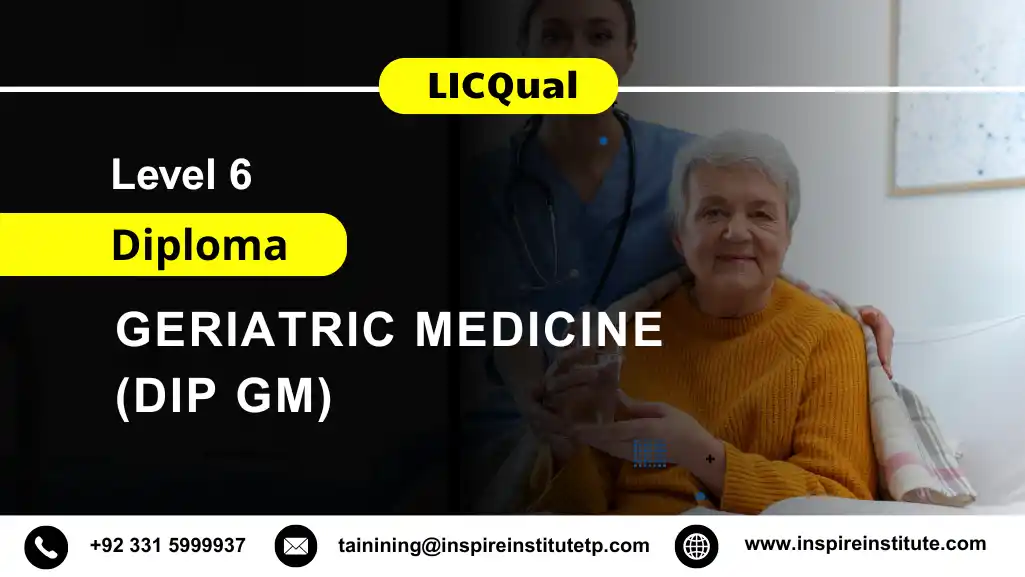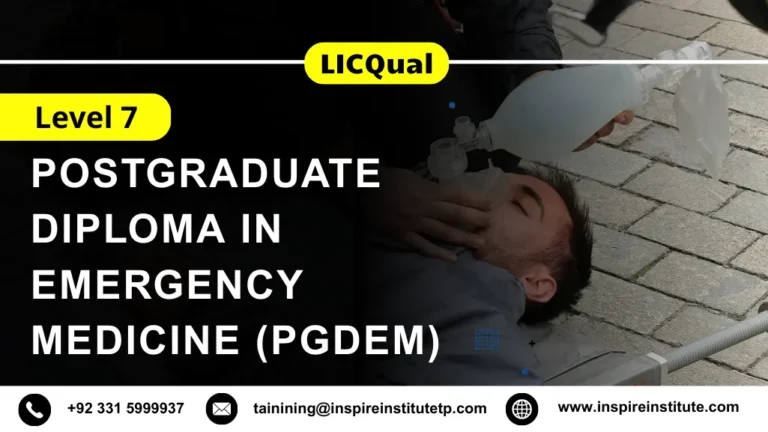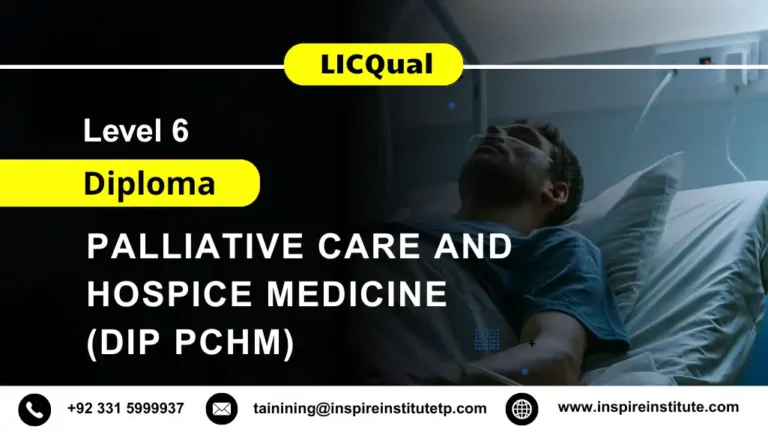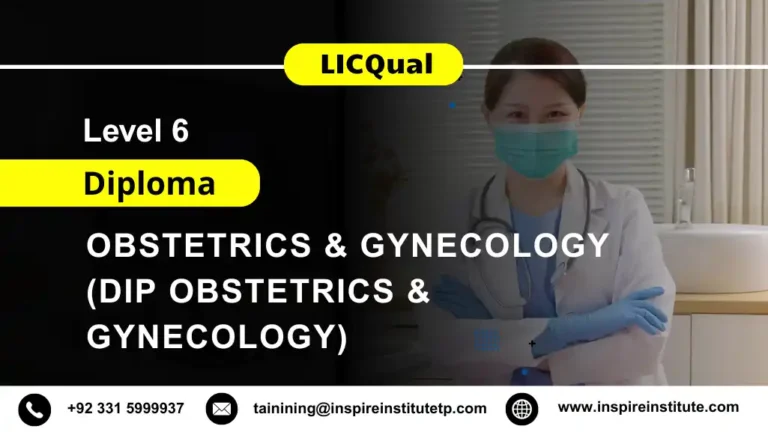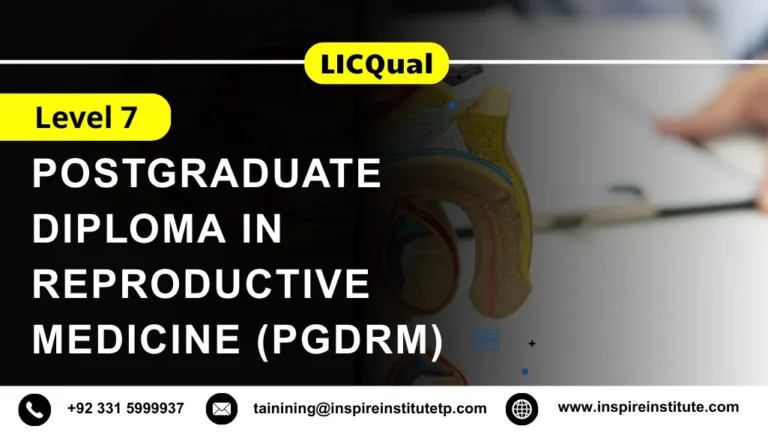LICQual Level 6 Diploma in Geriatric Medicine (Dip GM)
The LICQual Level 6 Diploma in Geriatric Medicine (Dip GM) is a UK-accredited qualification designed to equip healthcare professionals with advanced knowledge and practical expertise in the care of older adults. As populations age globally, understanding the complexities of geriatric health has become increasingly crucial. This comprehensive, assignment-based diploma integrates evidence-based medicine with practical clinical applications, enabling learners to manage age-related conditions, optimize patient outcomes, and enhance quality of life for elderly populations.
This Diploma in Geriatric Medicine offers a structured learning pathway that blends theoretical knowledge with real-world clinical skills. Learners explore topics such as geriatric syndromes, chronic disease management, polypharmacy, cognitive decline, and rehabilitation strategies. The course also emphasizes preventative care, ethical decision-making, and multidisciplinary collaboration, ensuring learners are prepared to address the unique healthcare needs of older adults.
The LICQual Level 6 Diploma in Geriatric Medicine is a recognised UK-accredited qualification that validates professional expertise in geriatric care. Graduates benefit from international recognition, boosting career prospects in hospitals, long-term care facilities, community health services, and research institutions. It also provides a strong foundation for further postgraduate studies or specialisation in gerontology and allied healthcare disciplines.
The LICQual Level 6 Diploma in Geriatric Medicine (Dip GM) empowers healthcare professionals to become leaders in geriatric care, combining advanced clinical knowledge, practical expertise, and globally recognised credentials to transform the future of elderly patient care.
Why Choose this Qualification
The LICQual Level 6 Diploma in Geriatric Medicine (Dip GM) equips healthcare professionals with the knowledge, skills, and practical experience needed to manage complex age-related conditions effectively. This qualification not only enhances clinical competence but also opens pathways to leadership roles, advanced studies, and global recognition in geriatric care.
Key Reasons to Choose this Qualification
Specialist Knowledge
- Gain comprehensive understanding of geriatric syndromes, chronic disease management, and polypharmacy.
- Explore cognitive decline, dementia care, and rehabilitation strategies in older adults.
- Learn evidence-based preventative care and health promotion for aging populations.
- Understand ethical decision-making, patient-centered care, and interdisciplinary collaboration.
- Develop expertise in evaluating clinical outcomes and optimizing patient quality of life.
Practical Application
- Apply advanced assessment techniques for geriatric patients in real-world scenarios.
- Develop individualized care plans using evidence-based interventions.
- Enhance skills in clinical decision-making, risk assessment, and patient safety.
- Practice communication and counselling strategies with older adults and caregivers.
- Implement rehabilitation and chronic care strategies to improve patient functionality.
Recognised Qualification
- Earn a UK-accredited diploma recognised internationally for clinical excellence.
- Validate professional competence in geriatric medicine for career advancement.
- Gain credibility for roles in hospitals, long-term care facilities, and community services.
- Access opportunities in research, teaching, and policy development.
- Open pathways for further postgraduate or specialist studies in gerontology.
Flexible Learning Pathway
- Study at your own pace with an assignment-based structure ideal for working professionals.
- Access online learning materials, mentorship, and interactive resources.
- Balance professional responsibilities while advancing your education.
- Benefit from structured guidance tailored to individual learning needs.
- Progress through modules without interrupting clinical practice.
Evidence-Based Training
- Engage with the latest geriatric research and clinical guidelines.
- Critically analyse patient data to inform care planning and treatment decisions.
- Implement validated interventions for improved patient outcomes.
- Enhance skills in evaluating the effectiveness of therapeutic strategies.
- Foster research-driven clinical practice for continuous improvement.
Career Development
- Expand career prospects in hospitals, clinics, community care, and academic institutions.
- Prepare for leadership roles such as Geriatric Specialist, Consultant, or Care Manager.
- Gain eligibility for fellowships, advanced certifications, and postgraduate studies.
- Strengthen professional profile for teaching, research, and healthcare policy roles.
- Enhance employability in both local and international healthcare sectors.
Enhanced Patient Impact
- Deliver safe, ethical, and patient-centered care to older adults.
- Develop strategies for early detection and prevention of age-related health issues.
- Improve functional outcomes, wellbeing, and quality of life for elderly patients.
- Implement culturally sensitive and sustainable care interventions.
- Contribute positively to the wider community and public health initiatives.
Professional Growth
- Strengthen leadership, analytical, and communication skills.
- Enhance clinical reasoning and problem-solving in complex geriatric cases.
- Build confidence in managing high-risk and multi-morbid patients.
- Develop reflective practice, collaboration, and team management competencies.
- Emerge as a skilled, knowledgeable, and confident geriatric healthcare professional.
The LICQual Level 6 Diploma in Geriatric Medicine (Dip GM) equips professionals with advanced clinical expertise, practical skills, and internationally recognised credentials, enabling them to transform geriatric care and elevate patient outcomes globally.practice worldwide.
Course Overview
LICQual UK Awarding Body
Average Completion Time:
6-24 Months
Study Units: 6 Units
Evidence & Assignment Based
Mandatory Units
Who Should Take This Course
The LICQual Level 6 Diploma in Geriatric Medicine (Dip GM) is designed for healthcare practitioners, clinicians, and allied professionals seeking advanced knowledge and practical expertise in geriatric care. This course Geriatric Medicine equips learners with the skills to enhance patient outcomes, lead multidisciplinary teams, and implement evidence-based interventions for elderly populations.
This course is suitable for
Medical Practitioners
- Physicians and general practitioners aiming to specialise in geriatric medicine.
- Doctors seeking advanced understanding of age-related diseases and complex care needs.
- Professionals interested in leading multidisciplinary care teams for older adults.
- Clinicians intending to implement evidence-based care protocols in hospital and community settings.
- Doctors pursuing career advancement or postgraduate studies in geriatrics.
Nurses and Advanced Nursing Professionals
- Registered nurses working in hospitals, long-term care, or community health.
- Nurse practitioners seeking specialised knowledge in chronic disease management for elderly patients.
- Professionals aiming to lead geriatric care initiatives and programs.
- Nurses interested in enhancing clinical assessment and patient monitoring skills.
- Those seeking recognition as advanced practice nurses in geriatrics.
Allied Healthcare Professionals
- Physiotherapists, occupational therapists, and speech therapists involved in elderly care.
- Professionals aiming to integrate rehabilitation and functional support strategies for older adults.
- Those seeking expertise in interdisciplinary collaboration for geriatric care.
- Healthcare staff looking to implement preventive and therapeutic interventions.
- Professionals desiring a career boost in gerontology-related services.
Healthcare Managers and Administrators
- Hospital administrators overseeing geriatric units or elderly care programs.
- Professionals aiming to implement quality improvement strategies in geriatric services.
- Managers seeking to enhance patient safety and outcome metrics for older populations.
- Healthcare leaders focused on policy development for elderly care.
- Administrators planning workforce training in geriatric medicine.
Public Health Practitioners
- Public health professionals addressing population-level aging issues.
- Practitioners designing health promotion and disease prevention programs for seniors.
- Those implementing community-based interventions for healthy aging.
- Professionals aiming to develop policies to improve elderly care outcomes.
- Researchers conducting epidemiological studies on aging populations.
Clinical Researchers
- Professionals involved in geriatric clinical trials or longitudinal studies.
- Researchers seeking specialised knowledge in geriatric syndromes and treatments.
- Professionals aiming to develop Geriatric Medicine evidence-based care protocols for older adults.
- Those interested in publishing or contributing to geriatric medicine research.
- Researchers pursuing collaborations with hospitals or academic institutions.
Care Home and Community Health Staff
- Staff managing care homes or residential facilities for elderly individuals.
- Professionals developing care plans, monitoring health, and improving quality of life.
- Team leaders aiming to implement evidence-based interventions in community settings.
- Care coordinators focused on early detection and preventive care for older adults.
- Staff pursuing professional recognition and advanced skills in geriatric care.
Aspiring Health Leaders
- Professionals aiming for leadership roles in geriatrics or elder care services.
- Those seeking advanced knowledge for strategic decision-making in healthcare settings.
- Leaders looking to improve patient outcomes through clinical and operational excellence.
- Individuals interested in mentoring and training multidisciplinary teams.
- Professionals targeting international recognition and career growth in geriatric medicine.
The LICQual Level 6 Diploma in Geriatric Medicine (Dip GM) is ideal for healthcare professionals committed to improving elderly care through advanced clinical expertise, practical skills, and leadership capabilities. This course empowers learners to make a measurable impact on patient outcomes and advance their professional journey in the evolving field of geriatric medicine.
Course Benefits
The LICQual Level 6 Diploma in Geriatric Medicine (Dip GM) is a UK-accredited qualification designed for healthcare professionals, clinicians, and aspiring leaders who aim to advance their expertise in elderly care, age-related disease management, and holistic geriatric practice. This assignment-based diploma integrates theoretical knowledge with practical applications, enabling learners to assess, plan, implement, and evaluate comprehensive geriatric care strategies. Through evidence-based learning and flexible study pathways, this qualification prepares professionals to improve older adult health outcomes and enhance quality of life for aging populations with confidence and competence.
Key Benefits of the Course
- Specialist Knowledge:
Gain an in-depth understanding of geriatric medicine principles, age-related pathophysiology, chronic disease management, and pharmacology. Learners explore critical topics such as cognitive disorders, mobility and functional decline, polypharmacy, and geriatric syndromes. The course also covers health policy, risk assessment, and preventive interventions, equipping learners to deliver effective, patient-centred care for older adults. - Practical Application:
Develop hands-on skills in assessing, managing, and monitoring elderly patients. Through case studies, research projects, and clinical simulations, learners enhance their ability to implement evidence-based interventions, manage complex comorbidities, and collaborate with multidisciplinary teams to improve care outcomes. - Recognised Qualification:
Earn a prestigious UK-accredited diploma that validates professional competence in geriatric medicine. The LICQual Level 6 Diploma in Geriatric Medicine (Dip GM) is recognised internationally, enhancing credibility and opening career opportunities in hospitals, elderly care facilities, research institutions, and healthcare policy organizations. - Flexible Learning Pathway:
Designed for working professionals, the assignment-based structure allows learners to study at their own pace. Learners have access to structured guidance, digital resources, and expert mentorship, ensuring seamless integration of learning with career responsibilities. - Evidence-Based Training:
Engage with the latest clinical research, geriatric care models, and international guidelines. The course emphasizes the application of evidence-based strategies for chronic disease management, preventive care, and functional assessment in older adults, enabling learners to make informed, impactful decisions. - Career Development:
This qualification expands career prospects across hospitals, long-term care facilities, community health organizations, and academic institutions. Graduates may pursue roles such as Geriatric Specialist, Clinical Consultant, Healthcare Administrator, or Research Coordinator. It also provides a foundation for advanced postgraduate studies in gerontology or related fields. - Enhanced Patient Impact:
Learn to implement ethical, culturally sensitive, and sustainable geriatric interventions. The diploma builds competence in addressing health disparities, promoting healthy aging, and improving overall well-being for elderly populations. - Professional Growth:
Strengthen critical thinking, clinical reasoning, leadership, and communication skills essential for geriatric practice. Graduates emerge as competent, confident professionals capable of advancing standards in elderly care.
The LICQual Level 6 Diploma in Geriatric Medicine (Dip GM) empowers professionals to become leaders in elderly healthcare management through advanced knowledge, practical expertise, and globally recognised credentials. It enhances career prospects while contributing significantly to improving health outcomes and quality of life for older adults worldwide.
Eligibility Criteria
The LICQual Level 6 Diploma in Geriatric Medicine (Dip GM) is a UK-accredited qualification designed for healthcare professionals, clinicians, and aspiring health leaders who aim to advance their expertise in elderly care, age-related disease management, and holistic geriatric practice. This assignment-based diploma integrates theoretical knowledge with real-world applications, preparing learners to assess, plan, implement, and evaluate comprehensive geriatric care strategies effectively.
Educational Background:
Applicants should hold a recognised qualification in medicine, nursing, healthcare, or a related field. A Level 5 diploma or equivalent qualification in healthcare, clinical practice, or medical sciences may also be accepted. Candidates with international degrees in geriatric medicine or allied disciplines will be evaluated individually to determine eligibility and equivalence to UK standards.
Professional Experience:
A minimum of one year of experience in healthcare, clinical practice, elderly care, or a related field is recommended. Previous exposure to geriatric assessment, chronic disease management, or patient-centred care provides an advantage. Motivated applicants with a strong interest in elderly healthcare, policy development, or community health management, even without direct professional experience, are encouraged to apply.
Age Requirement:
Applicants must be at least 18 years old at the time of enrolment. This ensures learners possess the maturity, ethical understanding, and professional responsibility required for advanced study and practical application in geriatric medicine.
Language Proficiency:
As the programme is delivered entirely in English, learners must demonstrate proficiency in reading, writing, and communication. A minimum IELTS score of 6.0 or an equivalent qualification is recommended for non-native English speakers to ensure effective participation in assignments, discussions, and assessments.
Technical Requirements:
Learners should have access to a computer or laptop with a reliable internet connection to participate in online learning, access study materials, and submit assignments. Basic computer literacy, including proficiency in research, data analysis, document preparation, and communication tools, is essential for academic success in this programme.
Required Documents:
Applicants are required to submit the following documents during registration:
A valid ID card or passport for identity verification.
Academic transcripts or certificates of previous qualifications.
Proof of professional experience in healthcare or elderly care (if applicable).
The Qualification Process
LICQual Level 6 Diploma in Geriatric Medicine (Dip GM) follows a structured pathway to ensure learners gain comprehensive knowledge, practical skills, and professional competence in community oral healthcare.
Step 1: Self-Assessment
Learners review the entry requirements to confirm eligibility. Candidates with a background in dentistry, oral health, or public health are encouraged to apply.
Step 2: Registration
Complete the registration process by submitting required documents such as proof of qualifications, a valid ID, and payment of enrollment fees.
Step 3: Induction
An induction session is conducted to:
- Verify learner eligibility and documentation.
- Introduce study materials, learning outcomes, and assessment procedures.
Step 4: Learning and Evidence Submission
Learners complete assignments, case studies, and practical exercises demonstrating competence in public health dentistry, community oral health assessment, preventive strategies, and program planning.
Step 5: Feedback and Revision
Assessors review submitted evidence and provide constructive feedback. Learners can revise and resubmit work to meet all required standards.
Step 6: Competence Validation
Final submissions are evaluated to confirm that learners have met all theoretical and practical learning outcomes.
Step 7: Internal Quality Assurance (IQA)
The IQA team reviews the assessment process to ensure accuracy, fairness, and compliance with international standards.
Step 8: External Verification (EQA)
External verifiers validate the authenticity and quality of learner achievements.
Step 9: Certification
Upon successful verification, learners are awarded LICQual Level 6 Diploma in Geriatric Medicine (Dip GM), demonstrating advanced proficiency in community oral healthcare and preparing them for professional growth in dental public health, preventive dentistry, and healthcare policy.

